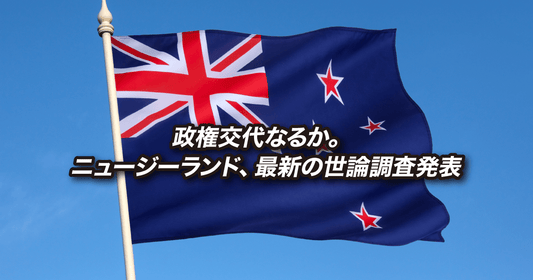
The 2020 General Election will be held in New Zealand on October 17th, with early voting beginning on October 3rd.
The event was originally scheduled for September 19th, but was postponed for about a month following the spread of COVID-19 in Auckland in August.
New Zealand holds general elections every three years, during which voters can choose political parties and candidates for office. There are 120 members in total. The ruling party must hold at least 61 seats.
In the last election in 2017, National won 56 seats, while Labour and the Green Party won a combined 54. NZ First won nine seats and decided to form a coalition with the Labour Party, with Jacinda Ardern leading the Labour Party as Prime Minister.
Jacinda, who is seeking re-election in this election, has 54% of the support as Prime Minister, far ahead of second-place National Party leader Judith Collins with 23%.
Voting rights in New Zealand
Currently, New Zealand has the right to vote if you are a New Zealand citizen or permanent resident aged 18 or over, except if you have not been a resident of New Zealand for 12 consecutive months.
New Zealand citizens or permanent residents living outside New Zealand are only eligible to vote if they have stayed in New Zealand for the past three years (for citizens) or for permanent residents for the past 12 months (for citizens) but have not stayed in New Zealand at least once in the past three years.
Australians, Maori from the Cook Islands, Tokelauans, and Niueans can gain the right to vote if they have been living in New Zealand for 12 consecutive months. Tokelau is a territory of New Zealand with a population of about 1,400, while Niue is a country in free association with New Zealand with a population of about 1,600.
How voting works
To vote in New Zealand, you must first register yourself as a voter and be added to the electoral roll. You can register or change your registration information online or by mail. You can register at any time, even on election day. However, if you register in advance, you will receive an EasyVote Card, which will help you vote quickly on the day.
There are quite a few polling stations available, some where you can vote in advance, and some only on the day of the election. This time, the number of polling stations has been increased as a measure to prevent the spread of COVID-19, and the voting period has been extended by two days. Measures have been taken to avoid overcrowding. Since people will inevitably gather on election day, people are being urged to vote as early as possible.
Also, although you can vote anywhere in the country, the process will be quicker if you vote close to home.
Two referendums at the same time
Two referendums will be held at the same time as this general election. One is the End of Life Choice referendum. Please read our previous news article "Will euthanasia be legalized in New Zealand? The decision will be made in a referendum in September."
The other is the Cannabis legalisation and control referendum, a referendum that will decide whether or not to legalise cannabis. As medical cannabis is already legal in New Zealand, the focus this time is on recreational cannabis. If legalised, detailed regulations such as the amount of cannabis to be purchased and used, the amount sold, where it can be used, and taxation have been proposed. If 50% of the people vote in favour, cannabis legalisation will move forward towards implementation.
Interim election tallies will be released on Election Day, October 17th, interim referendum tallies will be released on October 30th, and final results for both will be announced on November 6th.





